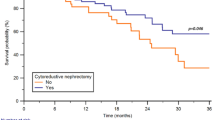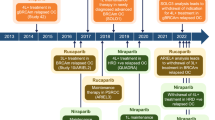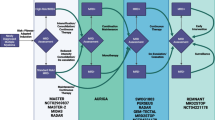Abstract
The correlation between the magnitudes of best tumor response (bTR) and patient survival in immune checkpoint inhibitor therapy for metastatic renal cell carcinoma (mRCC) remains unclear. In this article, we retrospectively investigated the prognostic association of the magnitude of bTR in nivolumab therapy for mRCC. Fifty-five patients treated with nivolumab after failure of at least one molecular-targeted therapy were evaluated. Assessment of the magnitude of bTR was based on the Response Evaluation Criteria in Solid Tumors (RECIST) v.1.1. Endpoints were progression-free survival (PFS) and overall survival (OS) after the initiation of nivolumab therapy. In regard to the magnitude of bTR, complete response, partial response, stable disease, and progressive disease were observed in three (5.46%), 15 (27.3%), 19 (34.5%), and 18 (32.7%) patients, respectively. PFS and OS were significantly correlated with the magnitude of bTR (median PFS: not reached (N.R.) [95% confidence interval (CI) 16.8–N.R.] vs. 13.0 [8.38–56.0] vs. 5.95 [4.27–7.30] vs. 1.92 [0.53–3.91] months, p < 0.0001; OS: N.R. [N.R.–N.R.] vs. N.R. [21.4–N.R.] vs. 23.3 [23.3–N.R.] vs. 7.36 [1.41–N.R.] months, p < 0.0001). In addition, multivariate analyses show that the magnitude of bTR was an independent factor for PFS (p < 0.0001) and OS (p = 0.0010). In conclusion, this retrospective study shows the significant correlation between the magnitude of bTR and patient survival in nivolumab therapy for mRCC. The magnitude of bTR can be an effective surrogate marker for survival.



Similar content being viewed by others
References
Motzer RJ, Escudier B, McDermott DF, George S, Hammers HJ, Srinivas S, et al. Nivolumab versus everolimus in advanced renal-cell carcinoma. N Engl J Med. 2015;373(19):1803–13. https://doi.org/10.1056/NEJMoa1510665.
Motzer RJ, Tannir NM, McDermott DF, Aren Frontera O, Melichar B, Choueiri TK, et al. Nivolumab plus ipilimumab versus sunitinib in advanced renal-cell carcinoma. N Engl J Med. 2018;378(14):1277–90. https://doi.org/10.1056/NEJMoa1712126.
George S, Rini BI, Hammers HJ. Emerging role of combination immunotherapy in the first-line treatment of advanced renal cell carcinoma: a review. JAMA Oncol. 2018. https://doi.org/10.1001/jamaoncol.2018.4604.
De Giorgi U, Carteni G, Giannarelli D, Basso U, Galli L, Cortesi E, et al. Safety and efficacy of nivolumab for metastatic renal cell carcinoma: real-world results from an expanded access programme. BJU Int. 2018. https://doi.org/10.1111/bju.14461.
Zahoor H, Barata PC, Jia X, Martin A, Allman KD, Wood LS, et al. Patterns, predictors and subsequent outcomes of disease progression in metastatic renal cell carcinoma patients treated with nivolumab. J Immunother Cancer. 2018;6(1):107. https://doi.org/10.1186/s40425-018-0425-8.
Busch J, Seidel C, Goranova I, Erber B, Peters R, Friedersdorff F, et al. Categories of response to first line vascular endothelial growth factor receptor targeted therapy and overall survival in patients with metastatic renal cell carcinoma. Eur J Cancer (Oxford, England: 1990). 2014;50(3):563–9. https://doi.org/10.1016/j.ejca.2013.10.017.
Grunwald V, McKay RR, Krajewski KM, Kalanovic D, Lin X, Perkins JJ, et al. Depth of remission is a prognostic factor for survival in patients with metastatic renal cell carcinoma. Eur Urol. 2015;67(5):952–8. https://doi.org/10.1016/j.eururo.2014.12.036.
Ishihara H, Kondo T, Omae K, Takagi T, Izuka J, Kobayashi H, et al. The magnitude of best tumor shrinkage during second-line targeted therapy affects progression-free survival but not overall survival in patients with metastatic renal cell carcinoma. Jpn J Clin Oncol. 2016;46(6):568–74. https://doi.org/10.1093/jjco/hyw024.
Ishihara H, Kondo T, Yoshida K, Omae K, Takagi T, Iizuka J, et al. Time to progression after first-line tyrosine kinase inhibitor predicts survival in patients with metastatic renal cell carcinoma receiving second-line molecular-targeted therapy. Urol Oncol. 2017;35(9):542.e1-.e9. https://doi.org/10.1016/j.urolonc.2017.05.014.
Ishihara H, Takagi T, Kondo T, Tachibana H, Yoshida K, Omae K, et al. Efficacy and safety of third-line molecular-targeted therapy in metastatic renal cell carcinoma resistant to first-line vascular endothelial growth factor receptor tyrosine kinase inhibitor and second-line therapy. Int J Clin Oncol. 2018;23(3):559–67. https://doi.org/10.1007/s10147-018-1241-3.
Eisenhauer EA, Therasse P, Bogaerts J, Schwartz LH, Sargent D, Ford R, et al. New response evaluation criteria in solid tumours: revised RECIST guideline (version 1.1). Eur J Cancer. 2009;45(2):228–47. https://doi.org/10.1016/j.ejca.2008.10.026.
Motzer RJ, Bacik J, Schwartz LH, Reuter V, Russo P, Marion S, et al. Prognostic factors for survival in previously treated patients with metastatic renal cell carcinoma. J Clin Oncol. 2004;22(3):454–63. https://doi.org/10.1200/jco.2004.06.132.
Seidel C, Busch J, Weikert S, Steffens S, Bokemeyer C, Grunwald V. Tumour shrinkage measured with first treatment evaluation under VEGF-targeted therapy as prognostic marker in metastatic renal cell carcinoma (mRCC). Br J Cancer. 2013;109(12):2998–3004. https://doi.org/10.1038/bjc.2013.662.
Queirolo P, Spagnolo F. Atypical responses in patients with advanced melanoma, lung cancer, renal-cell carcinoma and other solid tumors treated with anti-PD-1 drugs: a systematic review. Cancer Treat Rev. 2017;59:71–8. https://doi.org/10.1016/j.ctrv.2017.07.002.
Escudier B, Motzer RJ, Sharma P, Wagstaff J, Plimack ER, Hammers HJ, et al. Treatment beyond progression in patients with advanced renal cell carcinoma treated with nivolumab in CheckMate 025. Eur Urol. 2017. https://doi.org/10.1016/j.eururo.2017.03.037.
Tomita Y, Fukasawa S, Shinohara N, Kitamura H, Oya M, Eto M, et al. Nivolumab versus everolimus in advanced renal cell carcinoma: Japanese subgroup analysis from the CheckMate 025 study. Jpn J Clin Oncol. https://doi.org/10.1093/jjco/hyx049.
Nishino M, Giobbie-Hurder A, Gargano M, Suda M, Ramaiya NH, Hodi FS. Developing a common language for tumor response to immunotherapy: immune-related response criteria using unidimensional measurements. Clin Cancer Res. 2013;19(14):3936–43. https://doi.org/10.1158/1078-0432.ccr-13-0895.
Nishino M, Gargano M, Suda M, Ramaiya NH, Hodi FS. Optimizing immune-related tumor response assessment: does reducing the number of lesions impact response assessment in melanoma patients treated with ipilimumab? J Immunother Cancer. 2014;2:17. https://doi.org/10.1186/2051-1426-2-17.
Nishino M. Immune-related response evaluations during immune-checkpoint inhibitor therapy: establishing a “common language” for the new arena of cancer treatment. J Immunother Cancer. 2016;4:30. https://doi.org/10.1186/s40425-016-0134-0.
Tazdait M, Mezquita L, Lahmar J, Ferrara R, Bidault F, Ammari S, et al. Patterns of responses in metastatic NSCLC during PD-1 or PDL-1 inhibitor therapy: comparison of RECIST 1.1, irRECIST and iRECIST criteria. Eur J Cancer (Oxford, England: 1990). 2018;88:38–47. https://doi.org/10.1016/j.ejca.2017.10.017.
Seymour L, Bogaerts J, Perrone A, Ford R, Schwartz LH, Mandrekar S, et al. iRECIST: guidelines for response criteria for use in trials testing immunotherapeutics. Lancet Oncol. 2017;18(3):e143–e52. https://doi.org/10.1016/s1470-2045(17)30074-8.
Powles T, Albiges L, Staehler M, Bensalah K, Dabestani S, Giles RH, et al. Updated European Association of Urology guidelines recommendations for the treatment of first-line metastatic clear cell renal cancer. Eur Urol. 2017. https://doi.org/10.1016/j.eururo.2017.11.016.
Acknowledgements
The authors thank Ms. Nobuko Hata (Department of Urology, Tokyo Women’s Medical University) for the secretarial work.
Funding
This study did not receive any funding.
Author information
Authors and Affiliations
Corresponding author
Ethics declarations
Conflict of interest
Tsunenori Kondo received honoraria from Ono Pharmaceutical but did not have any nonfinancial conflict of interest to declare. All other authors have no conflicts of interest.
Ethical approval
The Internal Ethics Review Board of the Tokyo Women’s Medical University approved this retrospective study (ID: 4998), which was performed in accordance with the principals outlined in the Declaration of Helsinki. Because this was a retrospective study, no formal consent was required.
Additional information
Publisher’s Note
Springer Nature remains neutral with regard to jurisdictional claims in published maps and institutional affiliations.
Electronic supplementary material
Below is the link to the electronic supplementary material.
Rights and permissions
About this article
Cite this article
Ishihara, H., Takagi, T., Kondo, T. et al. Correlation between the magnitude of best tumor response and patient survival in nivolumab therapy for metastatic renal cell carcinoma. Med Oncol 36, 35 (2019). https://doi.org/10.1007/s12032-019-1261-5
Received:
Accepted:
Published:
DOI: https://doi.org/10.1007/s12032-019-1261-5




